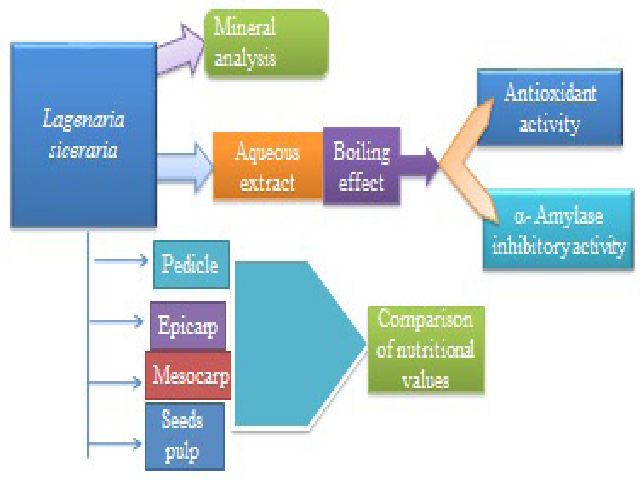Cooking Effect on Anti-oxidative and Alpha-amylase Inhibitory Potential of Aqueous Extract of Lagenaria siceraria Fruit and its Nutritional Properties
DOI:
https://doi.org/10.5530/fra.2016.1.5Keywords:
Anti-oxidative, Anti-diabetic, Cooking effect, Lagenaria siceraria, NutritionalAbstract
Objective: To evaluate effect of boiling for different durations on total phenolic content, total flavonoid content, antioxidant activity and alpha-amylase inhibitory activity of water extract of Lagenaria siceraria fruit, and to compare nutritional properties of its epicarp, mesocarp, seeds pulp and pedicle. Methods: The bioactivities of aqueous extract of fruit was evaluated after boiling for 10, 20, and 30 min. Moisture, ash, fiber, protein, carbohydrate and lipid contents and vitamin C of epicarp, mesocarp, seeds pulp and pedicle were determined using standard methods. Mineral elements (Fe, Cr, Cu, Ag, Mn, Zn, Ni, Co and Pb) were estimated by atomic absorption spectrophotometer. Results: DPPH (1,1-diphenyl- 2-picrylhydrazyl) antioxidant and alpha-amylase inhibitory activities, and phenolic content drastically decreases with increase in duration of boiling. Flavonoid content and antioxidant capacity in phosphomolybdate assay exhibited a slight increase. Epicarp had higher percentage of protein, carbohydrate and vitamin C than other parts of the fruit, while pedicle had the highest content of fiber, zinc, silver and chromium. Epicarp had the highest content of Copper. Iron was in the range of 3.4-5.13, cobalt 0.14-0.31 and lead 0.5-1.8 mg/100 g. Amount of zinc in pedicle was highest among all the trace elements (6.5%) in all parts. Conclusion: The study revealed that boiling duration affects antioxidant and alpha-amylase inhibitory activities of the fruit of L. siceraria. Peel and pedicle of the fruit should not be discarded as they are rich in nutritional properties.
Downloads
Metrics





